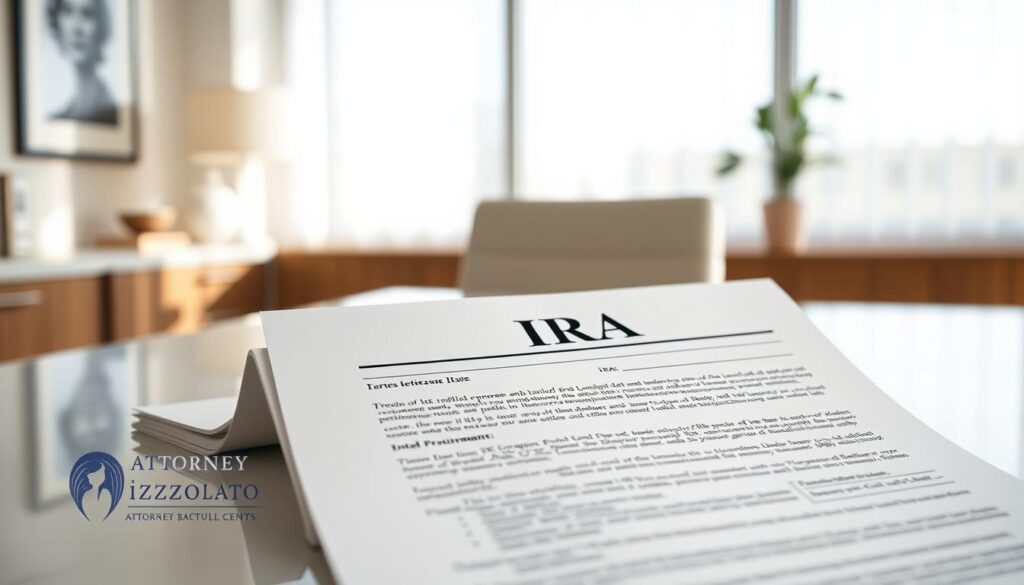As we navigate the complexities of securing our legacy, understanding the role of IRAs is crucial. In Lee County, our expertise can guide you through the process, providing peace of mind and clarity.
Estate planning is not just about taxes; it’s about protecting your family’s future. With the ever-changing tax landscape, our advisors can help you create a comprehensive plan that adapts to your needs.
We understand the importance of IRA strategies and their impact on your overall estate plan. Our goal is to educate and reassure you as you plan for the future.
Key Takeaways
- Understand the importance of integrating IRA strategies into your overall estate plan.
- Learn how to protect your family’s future with comprehensive estate planning.
- Discover the benefits of working with expert advisors in Lee County.
- Get insights into adapting your estate plan to the ever-changing tax landscape.
- Find out how to secure your IRA’s future with personalized guidance.
Understanding IRAs and Their Importance in Estate Planning
As you navigate the complexities of estate planning, grasping the fundamentals of IRAs is essential. IRAs, or Individual Retirement Accounts, are a crucial component of retirement planning, offering tax benefits and flexibility that can significantly impact your estate.
What is an IRA?
An IRA is a type of savings account that is designated for retirement savings. It allows individuals to save for retirement with tax advantages. According to the IRS, IRAs are a popular retirement savings vehicle. The funds in an IRA can be invested in various assets, such as stocks, bonds, and mutual funds, providing a potential for growth over time.

Types of IRAs Explained
There are several types of IRAs, each with its unique characteristics and benefits:
- Traditional IRA: Contributions may be tax-deductible, and the money grows tax-deferred. Withdrawals are taxed as ordinary income.
- Roth IRA: Contributions are made with after-tax dollars, so they are not deductible. However, the money grows tax-free, and withdrawals are tax-free if certain conditions are met.
- Other Types: There are also other types, such as SEP-IRAs and SIMPLE IRAs, designed for self-employed individuals and small business owners.
The Role of IRAs in Retirement Planning
IRAs play a vital role in retirement planning by providing a source of income in your golden years. They offer a way to save for retirement while deferring taxes until withdrawal, potentially reducing your taxable income during your working years. For more information on how IRAs fit into your estate plan, you can visit Pizzolato Law.
By understanding IRAs and their role in both retirement and estate planning, you can make informed decisions about your financial future. It’s essential to consider how your IRA will be distributed among your heirs and how it fits into your overall estate plan.
Key Estate Planning Concepts for Lee County Residents
As a Lee County resident, understanding the key concepts of estate planning is crucial for securing your legacy. Estate planning is a comprehensive process that involves creating a plan for the distribution of your assets after your passing. It’s about having a clear and comprehensive plan in place to ensure that your wishes are respected and your loved ones are protected.
What is Estate Planning?
Estate planning is the process of creating a detailed plan that outlines how your assets will be distributed after you pass away. It involves more than just creating a will; it’s about having a comprehensive strategy that includes various legal documents and tools. Estate planning is tailored to your unique needs and circumstances, ensuring that your assets are managed and distributed according to your wishes.
Why Is Estate Planning Essential?
Estate planning is essential for several reasons. Firstly, it ensures that your assets are distributed according to your wishes, minimizing the potential for disputes among your loved ones. Secondly, it helps in reducing taxes and other expenses associated with the distribution of your estate. Lastly, estate planning provides peace of mind, knowing that your loved ones will be taken care of according to your plans.
Common Estate Planning Documents
There are several key documents that are typically included in an estate plan. These include:
- Wills: A will outlines how you want your assets to be distributed after your passing.
- Trusts: Trusts can be used to manage and distribute assets, often providing tax benefits and avoiding probate.
- Powers of Attorney: Powers of attorney grant someone the authority to make financial or medical decisions on your behalf if you become incapacitated.
By understanding and utilizing these documents, Lee County residents can create a comprehensive estate plan that protects their assets and ensures their wishes are carried out.

Integrating IRAs Into Your Estate Plan
As you plan your estate, understanding how to integrate your Individual Retirement Accounts (IRAs) effectively can make a substantial difference in the legacy you leave behind. Incorporating IRAs into your estate plan can provide significant tax benefits and flexibility for your beneficiaries.
Benefits of Including IRAs in Estate Planning
Including IRAs in your estate planning strategy can offer several advantages. One of the primary benefits is the potential for tax minimization. By understanding how IRAs are taxed and how they fit into your overall estate, you can make informed decisions that minimize the tax burden on your heirs.
Another benefit is the flexibility IRAs offer in terms of distribution. You can designate beneficiaries for your IRA, allowing you to control who receives these assets and when. This can be particularly useful in complex family situations or when you want to ensure that certain beneficiaries are taken care of.
How IRAs Affect Inheritance
IRAs can significantly impact the inheritance your beneficiaries receive. The way you structure the distribution of your IRA can affect the amount your heirs ultimately receive. For instance, if you name a non-spousal beneficiary, they will typically be required to take distributions based on their life expectancy, which can impact the overall value of the inheritance.
It’s also important to consider the tax implications of IRA distributions. Beneficiaries may face income tax on the distributions they receive, which can reduce the net amount they inherit. Understanding these dynamics is crucial for effective estate planning.

Strategies for Transferring IRAs to Heirs
There are several strategies you can employ to transfer your IRA to your heirs efficiently. One common approach is to designate beneficiaries directly on the IRA account. This allows the assets to pass directly to the beneficiaries without going through probate, which can save time and reduce legal fees.
Another strategy involves using trusts. By placing your IRA in a trust, you can exert more control over how the assets are distributed and used by your beneficiaries. This can be particularly useful if you have concerns about the ability of your beneficiaries to manage the assets wisely.
| Strategy | Description | Benefits |
|---|---|---|
| Direct Beneficiary Designation | Name beneficiaries directly on the IRA account. | Avoids probate, saves time and legal fees. |
| Using a Trust | Place the IRA in a trust to control distribution. | Provides control over how assets are used, protects beneficiaries. |
| Stretch IRA | Allows beneficiaries to take distributions over their lifetime. | Minimizes taxes, maximizes growth potential. |
Tax Implications of IRAs in Estate Planning
Understanding the tax implications of IRAs is crucial for effective estate planning. As you navigate the complexities of managing your Individual Retirement Account within your estate plan, it’s essential to consider how taxes can impact the distribution of your assets.

Understanding Taxation on IRAs
IRAs are subject to various tax rules that can affect your estate. Traditional IRAs are taxed as ordinary income when distributions are made, whereas Roth IRAs are generally tax-free if certain conditions are met. Understanding these tax rules is vital to minimize tax liabilities.
The IRS provides guidance on the taxation of IRAs, including rules on Required Minimum Distributions (RMDs) and the tax implications of IRA withdrawals. We can help you navigate these regulations to ensure compliance and optimize your tax strategy.
Estate Taxes and IRAs
Estate taxes can also impact IRAs. When you pass away, your IRA becomes part of your taxable estate. Estate taxes may be applicable, depending on the size of your estate and the applicable exemption limits. It’s crucial to understand how estate taxes can reduce the value of your IRA and impact your beneficiaries.
We recommend consulting with estate planning professionals to assess the potential estate tax implications of your IRA and develop strategies to mitigate these taxes.
Strategies to Minimize Tax Liabilities
There are several strategies to minimize tax liabilities associated with IRAs in estate planning. One approach is to convert traditional IRAs to Roth IRAs, which can reduce future tax liabilities for your beneficiaries. Another strategy involves careful beneficiary planning, ensuring that your IRA is distributed in a tax-efficient manner.
- Consider charitable donations from your IRA to reduce taxable income.
- Use IRA assets to purchase life insurance, providing tax-free proceeds to your beneficiaries.
- Review and adjust your beneficiary designations regularly to ensure they align with your estate plan.
By implementing these strategies, you can minimize the tax burden on your beneficiaries and ensure that your estate is distributed according to your wishes.
Designating Beneficiaries for Your IRA
Designating beneficiaries for your IRA is a pivotal aspect of estate planning that ensures your assets are distributed according to your wishes. By understanding the importance of beneficiary designations, you can avoid common pitfalls and ensure a smooth transition of your retirement savings.
Importance of Beneficiary Designations
Beneficiary designations are crucial because they dictate who will receive your IRA assets upon your passing. This decision supersedes your will, making it a critical component of your estate plan. It’s essential to choose beneficiaries carefully, considering both immediate family members and other potential heirs.
According to experts, beneficiary designations are a critical aspect of IRA planning. By designating beneficiaries, you can ensure that your IRA is distributed according to your wishes, providing for your loved ones and minimizing potential conflicts.
Common Mistakes in Designation
One common mistake is failing to update beneficiary designations after significant life events, such as divorce or the birth of a child. Outdated beneficiary information can lead to unintended consequences, such as an ex-spouse receiving your IRA assets.
- Failing to name contingent beneficiaries.
- Not considering the tax implications for beneficiaries.
- Overlooking the need to update beneficiary information after major life changes.
Updating Beneficiaries Regularly
Regularly reviewing and updating your beneficiary designations is vital to ensure they remain aligned with your current wishes and circumstances. It’s recommended to review your beneficiary designations every few years or following significant life events.
| Life Event | Beneficiary Update Consideration |
|---|---|
| Marriage | Consider adding your spouse as a primary beneficiary. |
| Divorce | Remove your ex-spouse as a beneficiary unless intended. |
| Birth/Adoption of a Child | Add your child as a beneficiary or consider setting up a trust for them. |

By carefully considering your beneficiary designations and keeping them up to date, you can ensure that your IRA is distributed according to your wishes, providing peace of mind for you and your loved ones.
Choosing the Right Estate Planning Professional in Lee County
Selecting the right estate planning professional is a crucial step in securing your IRA’s future in Lee County. With so many options available, it’s essential to understand the different types of professionals you can work with.
Types of Professionals for Estate Planning
Estate planning involves more than just drafting a will; it encompasses a broad range of services including IRA management, tax planning, and more. In Lee County, you can find various professionals who specialize in different aspects of estate planning.
- Attorneys: Specializing in estate law, they can help with wills, trusts, and probate.
- Financial Advisors: They can provide guidance on managing your IRA and other investments.
- Certified Public Accountants (CPAs): CPAs can offer tax planning advice that complements your estate plan.
Understanding the roles of these professionals can help you decide who to consult for your estate planning needs.
Questions to Ask Your Advisor
When consulting with an estate planning professional, asking the right questions can ensure you find the best fit for your needs. Consider asking:
- What experience do you have with estate planning and IRA management?
- How do you stay updated with changes in estate planning laws?
- Can you provide examples of how you’ve helped clients with similar needs?
These questions can help you gauge the professional’s expertise and compatibility with your estate planning goals.
Understanding Fees and Services Provided
Estate planning professionals may charge differently for their services. It’s crucial to understand their fee structure and the services included.
Some common fee structures include:
- Flat fees for specific services like drafting a will.
- Hourly rates for more complex or ongoing services.
- Asset-based fees for investment management.
By understanding the fees and services provided, you can make an informed decision about which professional to work with.

Working with the right estate planning professional in Lee County can provide peace of mind, knowing that your IRA and overall estate plan are in good hands. Take the time to research and interview potential advisors to find the best fit for your needs.
Utilizing Trusts for IRA Management
Incorporating trusts into your IRA strategy can offer numerous benefits, including tax minimization and asset protection. As you navigate the complexities of estate planning, understanding the role of trusts in IRA management can be invaluable.
What is an IRA Trust?
An IRA trust is a type of trust that is specifically designed to manage and distribute Individual Retirement Account (IRA) assets. IRA trusts allow you to maintain control over how your IRA assets are distributed to beneficiaries, even after you pass away.
By using an IRA trust, you can ensure that your beneficiaries receive the assets in a tax-efficient manner. This can be particularly beneficial for beneficiaries who may not be experienced in managing large sums of money or for those who have creditor issues.
Advantages of an IRA Trust
There are several advantages to using an IRA trust as part of your estate plan. Some of the key benefits include:
- Tax Minimization: IRA trusts can help minimize taxes on IRA distributions, ensuring that more of your assets go to your beneficiaries.
- Asset Protection: By holding IRA assets in a trust, you can protect these assets from creditors and ensure they are used according to your wishes.
- Control Over Distributions: IRA trusts allow you to specify how and when distributions are made to beneficiaries, providing a level of control that is not possible with outright inheritance.
How to Set Up an IRA Trust
Setting up an IRA trust requires careful planning and the guidance of an experienced estate planning professional. Here are the general steps involved:
- Consult with an Estate Planning Attorney: An attorney specializing in estate planning can help you determine if an IRA trust is right for you and guide you through the setup process.
- Draft the Trust Document: The trust document outlines the terms of the trust, including how assets are to be managed and distributed.
- Fund the Trust: You will need to transfer your IRA assets into the trust, which may involve updating beneficiary designations.
- Manage and Maintain the Trust: Ongoing management of the trust is crucial to ensure it operates according to your wishes and complies with relevant laws.
By following these steps and working with the right professionals, you can create an IRA trust that effectively manages your retirement assets and provides peace of mind for you and your loved ones.
Protecting Your IRA from Creditors
One of the key concerns in estate planning is ensuring that your IRA is shielded from creditors. As you navigate the complexities of estate planning, understanding how to protect your Individual Retirement Account (IRA) from potential creditors is crucial for securing your financial legacy.
Understanding IRA Creditor Protection
IRA creditor protection refers to the legal safeguards that prevent creditors from accessing your retirement savings. The level of protection varies depending on the type of IRA you have and the laws of your state. Generally, IRAs are protected under federal law, but the extent of this protection can differ.
Key aspects of IRA creditor protection include:
- Federal law protection for ERISA-qualified plans
- Varying levels of protection for traditional and Roth IRAs
- State-specific laws that may offer additional protection
Legal Strategies to Enhance Protection
To maximize the protection of your IRA, several legal strategies can be employed. We recommend consulting with an estate planning professional to determine the best approach for your situation.
Some effective strategies include:
- Utilizing beneficiary designations to transfer IRAs outside of probate
- Creating an IRA trust to manage distributions and protect assets
- Converting traditional IRAs to Roth IRAs to potentially reduce tax liabilities
Considerations for Business Owners
For business owners, protecting an IRA from creditors involves additional considerations. Business assets and personal assets can sometimes become intertwined, potentially exposing your IRA to risk.
To mitigate this risk, we advise:
- Maintaining a clear separation between personal and business assets
- Utilizing business entities like LLCs or corporations to shield personal assets
- Regularly reviewing and updating your estate plan to reflect changes in your business and personal circumstances
Planning for Required Minimum Distributions (RMDs)
Navigating the complexities of RMDs is essential for retirees to minimize tax liabilities and maximize their estate’s value. As we age, the rules governing our retirement accounts become more complex, and understanding these rules is crucial for effective estate planning.
What Are RMDs?
Required Minimum Distributions (RMDs) are the minimum amounts that must be withdrawn from certain retirement accounts, such as traditional IRAs, each year once the account owner reaches a specific age. According to the IRS, RMDs are a critical aspect of retirement planning, as they dictate the minimum amount that must be distributed from these accounts annually.
Age and Amount Requirements for RMDs
The age at which RMDs must begin is currently set at 72 years old, as per the IRS guidelines. The amount of the RMD is calculated based on the account balance at the end of the previous year and the life expectancy factor as determined by the IRS tables. For instance, if you have a traditional IRA with a balance of $100,000 at the end of the previous year and your life expectancy factor is 27.4, your RMD for the year would be approximately $3,650.
How RMDs Impact Your Estate Plan
RMDs can significantly impact your estate plan, particularly in terms of tax implications. Larger RMDs can increase your taxable income, potentially pushing you into a higher tax bracket. It’s essential to plan for RMDs to minimize their impact on your estate. For example, considering leaving your retirement account to your minor requires careful planning to avoid unintended tax consequences.
By understanding and planning for RMDs, you can ensure that your estate is distributed according to your wishes while minimizing tax liabilities for your beneficiaries.
Yearly Reviews: Keeping Your Estate Plan Current
A well-crafted estate plan is essential, but it’s equally important to review it regularly to adapt to changing circumstances. As we navigate the complexities of estate planning, regular reviews help ensure that your plan remains aligned with your goals and compliant with any new laws or regulations.
Experts recommend reviewing your estate plan annually. This regular check-up allows you to make necessary adjustments to reflect changes in your personal life, financial situation, or the legal landscape. By doing so, you can ensure that your estate plan continues to achieve its intended purpose.
Importance of Regular Plan Reviews
Regular plan reviews are crucial for several reasons. Firstly, they help you adapt to changes in tax laws or other regulations that could impact your estate. Secondly, they allow you to update your plan to reflect changes in your family or financial situation. Lastly, regular reviews provide peace of mind, knowing that your estate plan is current and effective.
Key benefits of regular reviews include:
- Ensuring compliance with new laws and regulations
- Updating beneficiary information
- Adjusting for changes in financial status
- Reflecting changes in family dynamics
When to Update Your Estate Plan
It’s not just about reviewing your estate plan annually; there are specific life events that necessitate updates. These include marriage, divorce, the birth of a child, significant changes in financial status, or the death of a beneficiary. Updating your plan in response to these events ensures that it remains relevant and effective.
| Life Event | Action Required |
|---|---|
| Marriage | Update beneficiary information and consider spousal rights |
| Divorce | Remove ex-spouse from beneficiary designations and update wills |
| Birth of a Child | Add new child to beneficiary designations and consider guardianship |
Signs Your Plan Needs Revising
There are several signs that indicate your estate plan needs revising. These include changes in your financial situation, moves to a different state, or changes in your family dynamics. Additionally, if you’ve recently experienced a significant life event or if your current plan no longer aligns with your goals, it’s time to review and revise.
“Estate planning is not a one-time event, but a process that requires periodic reviews and updates to ensure it continues to meet your needs and goals.”
By recognizing these signs and taking proactive steps, you can ensure that your estate plan remains effective and continues to protect your legacy.
Local Resources for Estate Planning in Lee County
Lee County residents have access to various resources to help with estate planning. We understand the importance of utilizing local guidance to create a comprehensive plan that meets your needs.
Community Services and Workshops
Local organizations offer workshops and seminars on estate planning, providing valuable insights and information. These community services can help you stay informed about the latest strategies and best practices in estate planning.
Websites and Organizations for Guidance
Several websites and organizations provide estate planning guidance specific to Lee County. We recommend exploring these resources to gain a deeper understanding of the estate planning process and to find tools and templates to support your planning efforts.
Finding Legal Assistance in Lee County
For personalized guidance, consider consulting with a local estate planning attorney who is familiar with Lee County regulations. They can offer tailored advice and help you navigate the complexities of estate planning, ensuring that your plan is effective and compliant with local laws.
By leveraging these Lee County resources and estate planning guidance, you can create a robust estate plan that protects your legacy and provides peace of mind for you and your loved ones.













